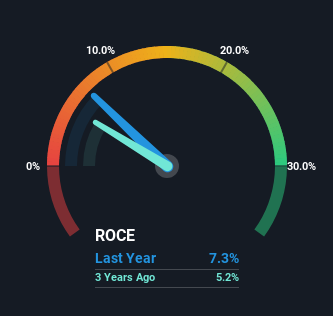- United Kingdom
- /
- Auto Components
- /
- LSE:TIFS
These Return Metrics Don't Make TI Fluid Systems (LON:TIFS) Look Too Strong
What financial metrics can indicate to us that a company is maturing or even in decline? Typically, we'll see the trend of both return on capital employed (ROCE) declining and this usually coincides with a decreasing amount of capital employed. This combination can tell you that not only is the company investing less, it's earning less on what it does invest. In light of that, from a first glance at TI Fluid Systems (LON:TIFS), we've spotted some signs that it could be struggling, so let's investigate.
Return On Capital Employed (ROCE): What Is It?
Just to clarify if you're unsure, ROCE is a metric for evaluating how much pre-tax income (in percentage terms) a company earns on the capital invested in its business. Analysts use this formula to calculate it for TI Fluid Systems:
Return on Capital Employed = Earnings Before Interest and Tax (EBIT) ÷ (Total Assets - Current Liabilities)
0.073 = €151m ÷ (€2.8b - €709m) (Based on the trailing twelve months to June 2023).
Therefore, TI Fluid Systems has an ROCE of 7.3%. In absolute terms, that's a low return but it's around the Auto Components industry average of 9.1%.
See our latest analysis for TI Fluid Systems

In the above chart we have measured TI Fluid Systems' prior ROCE against its prior performance, but the future is arguably more important. If you're interested, you can view the analysts predictions in our free analyst report for TI Fluid Systems .
What Does the ROCE Trend For TI Fluid Systems Tell Us?
The trend of returns that TI Fluid Systems is generating are raising some concerns. To be more specific, today's ROCE was 11% five years ago but has since fallen to 7.3%. In addition to that, TI Fluid Systems is now employing 21% less capital than it was five years ago. The combination of lower ROCE and less capital employed can indicate that a business is likely to be facing some competitive headwinds or seeing an erosion to its moat. Typically businesses that exhibit these characteristics aren't the ones that tend to multiply over the long term, because statistically speaking, they've already gone through the growth phase of their life cycle.
The Bottom Line On TI Fluid Systems' ROCE
In summary, it's unfortunate that TI Fluid Systems is shrinking its capital base and also generating lower returns. Investors must expect better things on the horizon though because the stock has risen 4.6% in the last five years. Either way, we aren't huge fans of the current trends and so with that we think you might find better investments elsewhere.
While TI Fluid Systems doesn't shine too bright in this respect, it's still worth seeing if the company is trading at attractive prices. You can find that out with our FREE intrinsic value estimation for TIFS on our platform.
While TI Fluid Systems may not currently earn the highest returns, we've compiled a list of companies that currently earn more than 25% return on equity. Check out this free list here.
The New Payments ETF Is Live on NASDAQ:
Money is moving to real-time rails, and a newly listed ETF now gives investors direct exposure. Fast settlement. Institutional custody. Simple access.
Explore how this launch could reshape portfolios
Sponsored ContentValuation is complex, but we're here to simplify it.
Discover if TI Fluid Systems might be undervalued or overvalued with our detailed analysis, featuring fair value estimates, potential risks, dividends, insider trades, and its financial condition.
Access Free AnalysisHave feedback on this article? Concerned about the content? Get in touch with us directly. Alternatively, email editorial-team (at) simplywallst.com.
This article by Simply Wall St is general in nature. We provide commentary based on historical data and analyst forecasts only using an unbiased methodology and our articles are not intended to be financial advice. It does not constitute a recommendation to buy or sell any stock, and does not take account of your objectives, or your financial situation. We aim to bring you long-term focused analysis driven by fundamental data. Note that our analysis may not factor in the latest price-sensitive company announcements or qualitative material. Simply Wall St has no position in any stocks mentioned.
About LSE:TIFS
TI Fluid Systems
Designs, manufactures, and sells thermal and fluid system solutions in Europe, Africa, the Asia Pacific, North America, and Latin America.
Reasonable growth potential and fair value.
Similar Companies
Market Insights
Weekly Picks

THE KINGDOM OF BROWN GOODS: WHY MGPI IS BEING CRUSHED BY INVENTORY & PRIMED FOR RESURRECTION


Why Vertical Aerospace (NYSE: EVTL) is Worth Possibly Over 13x its Current Price


The Quiet Giant That Became AI’s Power Grid
Recently Updated Narratives


A case for USD $14.81 per share based on book value. Be warned, this is a micro-cap dependent on a single mine.

Occidental Petroleum to Become Fairly Priced at $68.29 According to Future Projections

Agfa-Gevaert is a digital and materials turnaround opportunity, with growth potential in ZIRFON, but carrying legacy risks.
Popular Narratives


MicroVision will explode future revenue by 380.37% with a vision towards success


Crazy Undervalued 42 Baggers Silver Play (Active & Running Mine)





